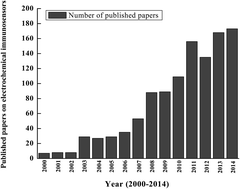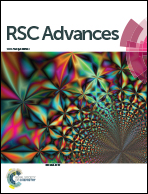Electrochemical immunosensors and their recent nanomaterial-based signal amplification strategies: a review
Abstract
In recent years, tremendous advances have been made in biosensors based on nanoscale electrochemical immunosensors for use in the fields of agriculture, food safety, biomedicine, quality control, and environmental and industrial monitoring. One of the main challenges in biosensors is achieving an extremely low limit of detection. A current trend to address this is fabrication of highly sensitive electrochemical immunosensors through the use of nanotechnology; for example, biofunctionalization of nanomaterials that are used as a catalyst, label or biosensing transducer. This review introduces recent advances in signal amplification strategies for electrochemical immunosensing applications, with a particular focus on nanotechnology. The strategies employed and their general principles to increase sensitivity, as well as the advantages and limitations of electrochemical immunosensors developed to date are also considered.


 Please wait while we load your content...
Please wait while we load your content...